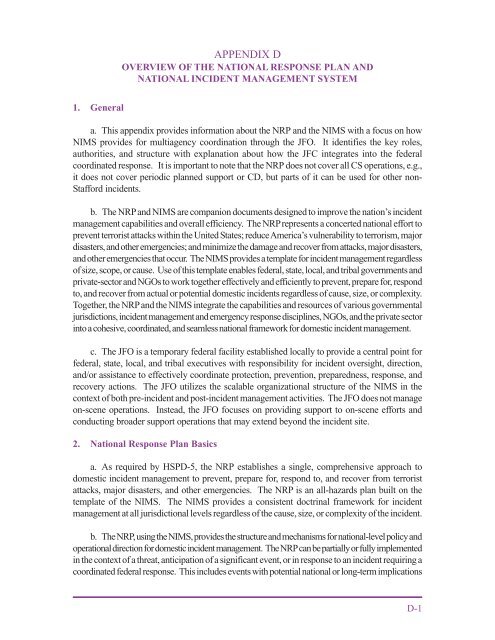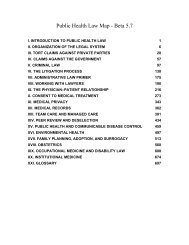JP 3-28, Civil Support - Federation of American Scientists
JP 3-28, Civil Support - Federation of American Scientists
JP 3-28, Civil Support - Federation of American Scientists
You also want an ePaper? Increase the reach of your titles
YUMPU automatically turns print PDFs into web optimized ePapers that Google loves.
1. General<br />
APPENDIX D<br />
OVERVIEW OF THE NATIONAL RESPONSE PLAN AND<br />
NATIONAL INCIDENT MANAGEMENT SYSTEM<br />
a. This appendix provides information about the NRP and the NIMS with a focus on how<br />
NIMS provides for multiagency coordination through the JFO. It identifies the key roles,<br />
authorities, and structure with explanation about how the JFC integrates into the federal<br />
coordinated response. It is important to note that the NRP does not cover all CS operations, e.g.,<br />
it does not cover periodic planned support or CD, but parts <strong>of</strong> it can be used for other non-<br />
Stafford incidents.<br />
b. The NRP and NIMS are companion documents designed to improve the nation’s incident<br />
management capabilities and overall efficiency. The NRP represents a concerted national effort to<br />
prevent terrorist attacks within the United States; reduce America’s vulnerability to terrorism, major<br />
disasters, and other emergencies; and minimize the damage and recover from attacks, major disasters,<br />
and other emergencies that occur. The NIMS provides a template for incident management regardless<br />
<strong>of</strong> size, scope, or cause. Use <strong>of</strong> this template enables federal, state, local, and tribal governments and<br />
private-sector and NGOs to work together effectively and efficiently to prevent, prepare for, respond<br />
to, and recover from actual or potential domestic incidents regardless <strong>of</strong> cause, size, or complexity.<br />
Together, the NRP and the NIMS integrate the capabilities and resources <strong>of</strong> various governmental<br />
jurisdictions, incident management and emergency response disciplines, NGOs, and the private sector<br />
into a cohesive, coordinated, and seamless national framework for domestic incident management.<br />
c. The JFO is a temporary federal facility established locally to provide a central point for<br />
federal, state, local, and tribal executives with responsibility for incident oversight, direction,<br />
and/or assistance to effectively coordinate protection, prevention, preparedness, response, and<br />
recovery actions. The JFO utilizes the scalable organizational structure <strong>of</strong> the NIMS in the<br />
context <strong>of</strong> both pre-incident and post-incident management activities. The JFO does not manage<br />
on-scene operations. Instead, the JFO focuses on providing support to on-scene efforts and<br />
conducting broader support operations that may extend beyond the incident site.<br />
2. National Response Plan Basics<br />
a. As required by HSPD-5, the NRP establishes a single, comprehensive approach to<br />
domestic incident management to prevent, prepare for, respond to, and recover from terrorist<br />
attacks, major disasters, and other emergencies. The NRP is an all-hazards plan built on the<br />
template <strong>of</strong> the NIMS. The NIMS provides a consistent doctrinal framework for incident<br />
management at all jurisdictional levels regardless <strong>of</strong> the cause, size, or complexity <strong>of</strong> the incident.<br />
b. The NRP, using the NIMS, provides the structure and mechanisms for national-level policy and<br />
operational direction for domestic incident management. The NRP can be partially or fully implemented<br />
in the context <strong>of</strong> a threat, anticipation <strong>of</strong> a significant event, or in response to an incident requiring a<br />
coordinated federal response. This includes events with potential national or long-term implications<br />
D-1

















